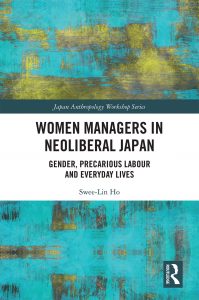Women Managers in Neoliberal Japan: Gender, Precarious Labour and Everyday Lives
By Swee-Lin Ho
 Book Description
Book Description
This book, based on extensive original research, presents a detailed analysis of the varying opportunities and challenges experienced by Japanese women with professional careers, an important category of the population in Japan, whose lives remain little known. It addresses many key issues, including the problems of flexible work in an increasingly neoliberal environment; the pervasiveness of precarious work conditions in gendered managerial employment; the state’s neglect in transforming antiquated labour laws and in combating abusive corporate practices; the implications of dysfunctional employee-employer relations and those among co-workers; media representations as barometers of resistant social norms; the ambivalent effects of work related drinking practices; and the lack of collective representation due to ineffective labour unions. Overall, the book presents the disheartening realities of conflicts and ambivalence experienced by many women managers in contemporary Japan.
Table of Contents
1 ‘Womenomics’: To Make Women Shine or Die?
2 In the Media: As Flowers, Parasites, Loser Dogs and Demons
3 In the Company of Co-Workers: Performing Gender and Drinking for Survival
4 In the Office: As Nominal Managers and Corporate Props
5 To the State: As Victims and Perpetrators of Power Harassment
6 A Shiny or More Precarious Future?
Biography
Swee-Lin Ho is Associate Professor of Anthropology in the Department of Sociology at the National University of Singapore. Her research interests include the neoliberal transformations of work, new practices of friendship; changing cityscapes and the urban night space; ethnographic field methods and ‘studying up’ approach; globalization of East Asian popular culture; emergent corporate cultures; the commercialization of intimacy; social formations of gender; and the political economy of the global classical music industry.
She worked for many years in various international cities as auditor, financial journalist and corporate executive before completing her graduate studies at Sophia University and later the University of Oxford. She has taught in South Korea, where she was also a Korea Foundation Research Fellow studying the conflicting desires of gendered selfhood, nationhood and cultural identities through the globalization of contemporary Korean popular culture.
